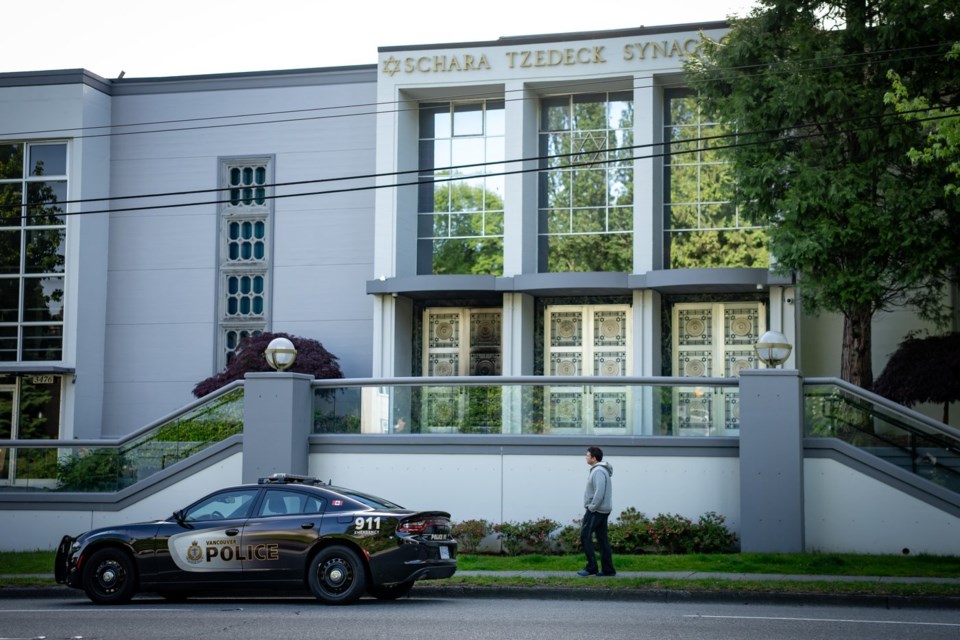Members of Canada's Jewish community expressed both anxiety and resolve on Saturday at Shabbat services held following a week of attacks targeting schools and religious institutions that have further stoked fears of rising antisemitism.
In Vancouver, the Schara Tzedeck synagogue held its first service since the building's front door was charred Thursday night by what police say was an act of arson.
Two police cars were stationed at the front of the synagogue Saturday as worshippers filed in through an entrance to the side of the ornate metal main doors, some of which were still blocked off with caution tape.
Ahead of the morning service, worshippers expressed both dismay at the attack and their firm intention to stand strong in the face of it. Jeff Hayes was among them.
"It's meaningful to come right afterward and show those who wanted to intimidate us that we are not intimidated and are unwavering in our commitment to our religion, and to Israel," he said in an interview ahead of the service.
Hayes said he wasn't worried about being attacked, and that Thursday's incident was "stupid" when people are so free to express disagreement in other ways.
"To express oneself through violence and intimidation is a waste of democracy," he said. "It is trivializing and taking the blessing of democracy for granted."
Gidon Frame said feeling under attack is not necessarily new, noting the long history of persecution of the Jewish people.
"We were shocked and horrified but not surprised," he said.
"It's always important to celebrate the Sabbath, but even more so when we are under attack," he added.
The fire at the Schara Tzedeck synagogue came days after shots were fired at a Jewish girls school in Toronto and bullet holes were found in a Montreal building housing a Jewish school and synagogue.
Politicians of all stripes have voiced strong condemnations of the both the specific attacks and a general rise of antisemitism.
Numerous police forces have reported an increase in suspected hate crimes targeting Jewish people since the latest war between Israel and Hamas broke out on Oct. 7, and a report on antisemitism released last month by advocacy group B'nai Brith Canada documented a massive spike in 2023. Based on incidents reported to B'nai Brith, including through collaborations with police, the report found there were 5,791 documented acts of violence, harassment and vandalism aimed at Jews that year, more than twice the 2,769 incidents logged in 2022.
Nobody was physically injured in the three most recent attacks against Jewish institutions, but the pattern of violence, coming on top of several other targeted acts in recent months, has left many in the Jewish community shaken.
“It's really challenged our community, and been very unsettling and very unnerving," Phyllis Berck, a member of the First Narayever synagogue congregation in Toronto, said on Saturday.
She said security is on many community members' minds, but anxiety has not deterred them from coming out to practice their faith.
"There just seems to be a somewhat larger turnout, and I think people are looking for that sense of community."
That was the case at First Narayever on Saturday, where pews were packed with congregants celebrating a bar mitzvah and praying for peace.
Edward Elkin, rabbi of the First Narayever synagogue, said that while there's certainly disagreement over what Israel should or shouldn't be doing, the congregation was uniformly horrified by the shooting in Toronto a week earlier.
He described the recent violent acts as an attempt to terrorize and do tremendous damage.
"We're all better off if we, with all our disagreements about things that are going on there, and things that are going on here, that we could find a line of what's an acceptable way of expressing disagreement."
He said he maintains his faith in human nature and is trying to strike a balance between awareness that these incidents are happening, sometimes frighteningly close to home, and remembering that overall the congregation still lives in a safe place.
"We still feel that by and large, the vast majority of people among whom we live mean us well, as do we mean them well."
This report by The Canadian Press was first published June 1, 2024.
— By Brieanna Charlebois in Vancouver and Ian Bickis in Toronto.
The Canadian Press

